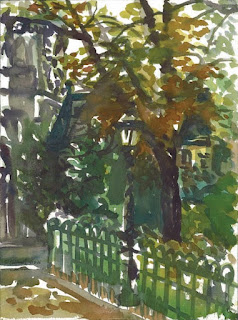For my class on Ethics and Values in the Arts that I taught at the Pitchess Detention Center in Castaic, I tried to simplify the centuries of moral teaching into a clear scheme that's easy to visualize and remember. I came up with an idea of focusing on virtues, and selected Four Cardinal Virtues as the core. I enriched this framework with what I called the Four Moral Actions. Below are fragments of my introduction that outline some of these fruitful ideas. I end with a couple of poems on gratitude, that I'm gradually learning every day.
On Cardinal Virtues and Moral Actions
What is a Virtue? Virtues are character traits that help individuals orient their lives towards a greater good. Virtues help people act properly, morally. The word “virtue” stems from a Latin root, “virtus” – which, in turn, comes from the word “vir” – “man.” The dictionary definition brings together several related meanings:
- 1. Moral excellence; goodness; righteousness.
- 2. Conformity of one's life and conduct to moral/ethical principles; uprightness; rectitude.
- 3. A particular moral excellence, like cardinal virtues
- 4. A good or admirable quality or property: the virtue of knowing one's weaknesses.
A traditional list is that of the Seven Contrary Virtues which are opposites of the Seven Deadly Sins:
- Humility – the opposite of Pride
- Kindness – the opposite of Envy
- Abstinence – the opposite of Gluttony
- Chastity – the opposite of Lust
- Patience – the opposite of Anger
- Liberality – the opposite of Greed
- Diligence – the opposite of Sloth
Its focus on the negative, the deadly sins merely mirrored in the positive attributes, has underscored centuries of moral education that centered on avoidance of evil and fear of punishment, instead of pursuit of the greater good for good’s sake. The purpose of virtues is to act more human, to help create and strengthen societal bonds based on love (trust, honesty, fairness) and to help each individual succeed in his or her pursuit of personal happiness.
In the 20th century, a French philosopher, Andre Comte-Sponville wrote a treatise about 18 different virtues, which included all the above Spiritual/Cardinal Virtues and more. This set of virtues appears in the context of his atheistic and humanistic philosophy: Politeness, Fidelity, Prudence, Temperance, Courage, Justice, Generosity, Compassion, Mercy, Gratitude, Humility, Simplicity, Tolerance, Purity, Gentleness, Good Faith, Humor, Love.
The unusual list includes the “pre-virtue” of politeness with a surprising and the novel virtue of humor. The discussion of these virtues will be focused on their links to underlying values – physical, psychological or spiritual, and their expressions from the values of being useful, through being pleasurable, to being, to being spiritual.
What about the Cardinal Virtues?
They were outlined in the classic antiquity by Aristotle and Plato:
- Courage (Fortitude),
- Wisdom (Prudence),
- Justice, and
- Moderation (Restraint, Temperance).
These “four cornerstones of the soul” have been taught to generations to create a moral framework for individual lives and create a balance between the excesses of each of these virtues appearing by itself, in isolation. In the four-part ethical framework presented here, the severity of Justice is balanced by the gentleness of Wisdom (Prudence), which, without the urgent sense of fairness could devolve into fear and inaction. The bravado of Courage (Fortitude) is balanced by the meekness of Moderation (Temperance, Restraint), which, without the passion of courage, may result in withdrawal and passivity.
The image of the “cardinal” virtues is related to the “cardinal points” on a map (North-East-South-West), as a compass for moral life. In a graphic representation, the virtues are located at 0, 90, 180, and 270 degrees on the circle, with the heart of an individual in its center. In another image, they form a circle around a central point and connect to one another; thus surrounding and protecting the core of one’s being.
The balancing act of practicing the cardinal virtues requires a focus on the present, on this infinitely small point in time in which we live, constantly moving from the past to the future. It is by paying attention to present actions, thoughts, and emotions, and by seeking the proper balance of justice with wisdom, and courage with moderation, that an individual may act in a virtuous way and may set a course of his/her life towards real happiness.
The four cardinal virtues, practiced in a way that they balance each other and help the individual remain in the center: courage will be tempered by moderation, wisdom will inform justice. The virtues will change the invisible attitude but will be visibly expressed in moral actions. The direction for the cardinal virtues, the “needle of the compass” are the three spiritual virtues: faith (in one’s own goodness and potential on the one hand and in the goodness of the world on the other), hope (in one’s ability to accomplish one’s goals in the future and in the benevolence of others who will be helpful and will share one’s successes and help on the spiritual path) and love (for oneself and others, spreading from within in concentric circles from the nearest kin and closest friends, to all people).
THE CORNERSTONE
Justice: Do what's right, what's fair.
Fortitude: Keep smiling. Grin and bear.
Temperance: Don't take more than your share.
Prudence: Choose wisely. Think and care.
Find yourself deep within your heart
In a circle of cardinal virtues
The points of your compass
YOUR CORNERSTONE.
Once you've mastered the steps, new ones appear:
Faith: You are not alone . . .
Hope: And all shall be well . . .
Love: The very air we breathe
WHERE WE ARE. . .
_____________________________________
The poem may be recited by a group of at least three participants - the colors indicate individual voices and the text in black font and caps is said by the whole group. Try it!
_____________________________________
Virtues in Practice: Moral Actions
In order to be fully effective and surround the individual with a protective circle that will ensure selecting the best option from thousands of possible choices, the Cardinal Virtues should be associated with a mirror framework of four Moral Actions that both modify and express them.
- Compassion (Justice) – I am compassionate, I share pain
- Forgiveness (Courage) – I am forgiving, I let go of pain
- Generosity (Moderation) – I am generous, I share joy
- Gratitude (Wisdom) – I am grateful, I thank for joy
I selected these four Moral Actions from a multitude of possibilities as echoes or reflections of emotions with which they are bound; these are the opposite of such actions that would result from fully giving in to negative emotions.Compassion or co-suffering is an antidote for anger and grief; it helps break the isolation and alienation caused by the negativity of violence (anger) or withdrawal (grief). Forgiveness breaks apart the toxic shame and fear that again, prevent us from integrating ourselves into whole and healthy individuals and connecting to others in a healthy, well-adjusted way. It is, by far, the hardest of all Moral Actions, as it is based on overcoming the consequences of profound traumas, seared in the memory of pain. Generosity reaches out to the others, while Gratitude permeates the person and all the individual actions with a spirit of thankfulness that lights it all up with joy from within.
The Moral Actions, when taken and practiced together, unify a person’s core being around positive, healing attitude that extend from self to others, from an individual self-definition, to the self-in-the-world. Compassion and Generosity breaks the isolation and create communities. Forgiveness and Gratitude have the greatest healing impact internally, when applied to oneself. Practicing these Moral Actions, based within Cardinal Virtues is a transformative act that results in the healing of an individual person while simultaneously healing the world. Through the practice of Virtue, the present moment is permeated with positive Moral Actions.
Justice is truly “fair” when it is based on compassion, defined as shared suffering, “feeling for/with the other,” or “I know your pain.” Courage to forgive is far more powerful than courage to fight, it is far more liberating than courage to merely endure and survive. Forgiveness gives rise to courage, courage to forgiveness. The generosity of sharing joy may be the one difference between a true saint and an ordinary moral person. For the ordinary person, lacking the convictions or the endurance of a saint, generosity is to be tempered by Moderation, all actions made within reason. True Wisdom arises from gratitude: we are deeply thankful for every opportunity to feel, live and share, grateful for every day, every breath. Immanuel Kant (1724-1804) expressed the feeling of universal gratitude in a beautiful maxim: “Two things awe me the most: the starry sky above me and the moral law within me.”
Intertwined with the Cardinal Virtues, the four Moral Actions form yet another protective circle of goodness. Compassion and Generosity are primarily directed outside the circle, towards others whose suffering we understand and with whom we share our gifts. Forgiveness and Gratitude are primarily directed inwardly. We heal ourselves first; we learn to be thankful for our own gifts first. Then we can turn towards the others. The image of oxygen masks falling down on the plane is appropriate here: the adult passengers have to put on, adjust and fasten their own masks first, and only later, while already able to breathe, they should turn to take care of others. We heal ourselves by forgiving ourselves first and by learning to be thankful for the little things in life. Then, we can go on and find a place, mission, or purpose for our future Moral Actions concerning others.
___________________________________
SONG OF GRATITUDE
Love’s gift cannot be given, It waits to be accepted
~ Rabindranath Tagore, “Fireflies”
I’m filled with gratitude. It makes me sleepy.
I’m ready to purr with contentment
like a stray cat that found its pillow.
The warmth of satiation shines
a smile plays in the corner of my mouth,
full of your kisses - the softest kind.
My lungs expand with fresh afternoon breeze
bearing a hint of orange blossoms
Too early for jasmine. I close my eyes.
I live in the moment when our togetherness
slipped from my fingers. I listen
to the monotone chant of the mourning dove.
I watch the ruckus of house sparrows
fighting for a crumb on a cement path
overgrown with weeds, sprouting through crevices.
Life is stronger than stone.
I’m grateful for each breath
filled with loving you. I rest
in this knowledge, this air...
The Good One, the All-Knowing Wisdom
will not deny my prayers. Shameless, insistent,
I’m the dove that refuses to be silent.
This is my song. This is my melody,
My thankfulness, my Amen.
Let it be, God, let him be.
(c) 2009 by Maja Trochimczyk
_________________________________
A Box of Peaches
You locked your Wisdom in a gilded box
Placed dainty flowers where metal bars
Cross to hold them
You made a window for Compassion
To look out from onto the world
Glowing with the unseen
Would the talisman of the Smiling One
In your pocket save you? Draw luck
To your game of cards?
Let it be, let the ancient words fall
On a carpet of bronze petals on your path
Dappled with tree shadows
Walk slowly through the magic
Orchard filled with an avalanche of peaches
Ripening in the sunset
Stoop down to pick one, feel its warmth
In your hand, taste the mellow richness
beneath the fuzzy, wrinkled skin
Say to no one in particular
The sun maybe, or the tree, or this late hour –
Thank you, yes, thank you very much
(c) 2011 by Maja Trochimczyk
___________________________________________
NOTE: Photos of pomegranates and Liquid Amber trees in Sunland, November 2012 by Maja Trochimczyk. The peaches were too early. We ate them in July.





.JPG)
.JPG)




.jpg)


.JPG)

.JPG)
.JPG)
.JPG)








